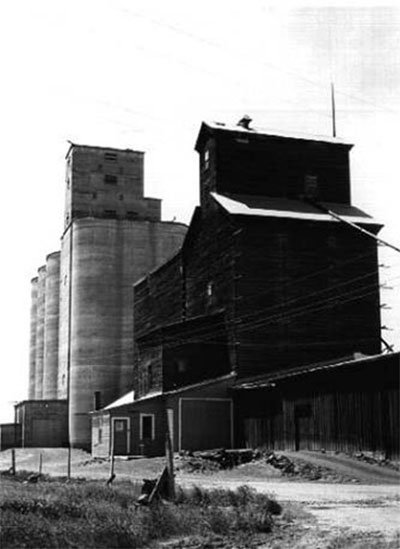“Settlement made centers necessary. Homesteaders needed many things, among them being farm machinery, glass for windows, stoves, nails, barbed wire and some staple foods. Stores were started and post offices established and ambitious men laid out town sites, some actually platted and some only planned.”
~ Giles L. French, The Golden Land, 1958.
Businessmen and entrepreneurs planned and platted town sites, two of which, Kenneth and Zola, saw no development. Jesse Eaton received the first post office commission for Spanish Hollow in 1870.
Biggs was first located on the east bank at the mouth of Spanish Hollow. It grew as a post telegraph and express town and rail station at the junction of the main Oregon Rail & Navigation Company / Union Pacific Railroad line along the Columbia River and the Columbia Southern Railway branch into Sherman County, The present day junction is formed by Highway 30, Highway 97 and Interstate-84.
MoreDeMoss Springs is the third name for this temperance town site and post office in section 3, T1S, R17E near where the DeMoss musical missionary family settled in 1883. Mrs. J.M. DeMoss selected the town site for the family headquarters when the land was claimed by Pierre Cutchier (aka Pierre Couture, Pierre Gordon). The temperance town plat was filed in the county clerk’s office in February, 1898. The streets were named E and W for noted musicians and N and S for poets.
MoreErskine
Erskine was named for 1880 settler Abel Erskine whose homestead was a half-mile N of the Erskine railroad station, and on the route of The Dalles Military Road. Located three miles SW of Moro, the site was called Erskineville, Erskine Springs, Mud Spring, Milbra and Erskine, the name of the rail station. This little hamlet boasted a general store that housed the post office, a skating rink, grain warehouse and schoolhouse. The town was platted in 1888.
The Villard post office opened in May 1880 on the Columbia River railroad during 1880s rail construction, named for Henry Villard, the railroad builder and economic leader. This hamlet was later called Grant for William Grant. It was platted in 1883 by William Murray and W. Lair Hill, burned in 1883, rebuilt and lost to flood in 1894. ~ASC 1913; Jack White; Curt Tom; SC: FTR 9-1.
Pioneer settlers reported rye grass so tall in this region that it was well over a man’s head, even so when on horseback. The Cut-off to the Barlow Road ran through Grass Valley. The first white settlers were Californians, Dr. C.R. Rollins and his son, John W. Dow and his wife, Mr. Locke and Frank Richie in 1878. Dr. Rollins claimed to have grown and threshed the first wheat in 1879. He built a hotel, platted and named the town, established an inn, Grass Valley House, and was the only practicing physician between the rivers and south to Antelope.
MoreThe first Kent town site was on the Canyon City road. The Columbia Southern rail branch line reached Kent and Shaniko in 1900 and Kent and the post office were moved to the railroad. By 1905 the population was 250 and the grain warehouses, saloon, and general merchandise store served the outlying ranchers.
Henry Barnum settled in 1868 and called it Seedum Valley. Moro was selected as the county seat in 1892, some years after the county was formed in 1889, and incorporated in 1899. The first store was built about 1879. The original town site was purchased in 1882 by Scott & Co. and platted by Scott and McCoy, leading merchants, with streets numbered and named: Scott, McCoy and Jewett, First, Second, Third, Fourth and Main. Several versions describe the naming of Moro: 1] Owen McCoy Scott, who came from Moro, Illinois, named it; 2] Melissa Hampton drew the name she submitted from a hat; 3] John Scott, the first postmaster in 1884, wanted a short name to accommodate the correspondence of Scott and McCoy, and that a clerk named Truelove in Scott and McCoy’s establishment came up with the name.
MoreWallis Station on the OR&N Railway and Rufus were named for Rufus Carroll Wallis. He settled at Chamberlin Flat across the Columbia River in the 1860s, and was instrumental in building Rufus on the Oregon side where he started the post office in 1886. Rufus operated a ferry, grain warehouses and some Rufus businesses, including the first hotel. In 1898, Rufus was a bustling river and railroad town with general merchandise store, bakery, livery stable, dealers of lumber, coal, wood, wagons and carriages, a saloon, hotel, and grain and fruit storage and shipping facilities. Steamboats, the Yukon in 1895 and the Columbia in 1902, were built at Rufus.
In 1880, Wilson M. Barnett, pioneer merchant and banker, had a little store on his Spanish Hollow homestead N of present-day Wasco which he moved to Dunlap’s ground at Wasco in 1882. Wasco bears the name of Sherman County’s parent county. The town was formed at the intersection of four homestead corners existing in 1882: McPherson’s on the SE, Biggs on the SW, Armsworthy on the NE and Dunlap on the NW. The original town was largely on Dunlap’s tract and he platted the town 16 July 1883 when the town had the first church in the county and blacksmith and machine shops. McPherson and Armsworthy did not grant rights-of-way for roads while Biggs and Dunlap did.
If all the businesses in town are run like country businesses, You are going to have a country town ― William Faulkner, The Sound and the Fury








